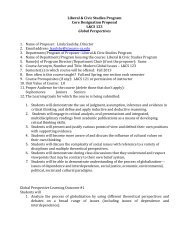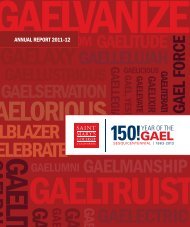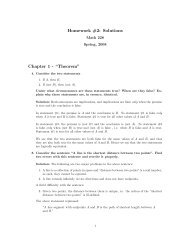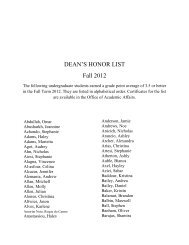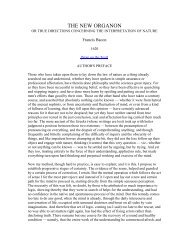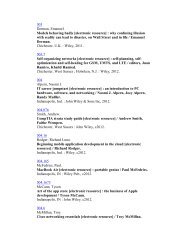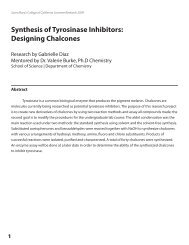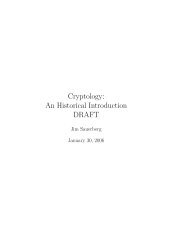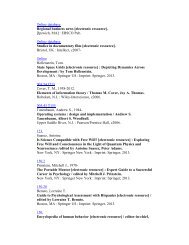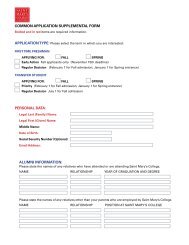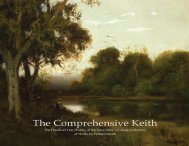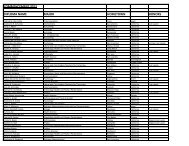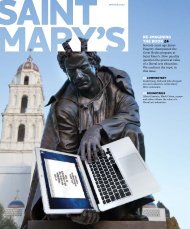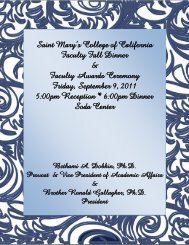2008-09 Catalog - Saint Mary's College of California
2008-09 Catalog - Saint Mary's College of California
2008-09 Catalog - Saint Mary's College of California
Create successful ePaper yourself
Turn your PDF publications into a flip-book with our unique Google optimized e-Paper software.
Curriculum Politics116 Research Theory and MethodsThis course explores the theoretical basis <strong>of</strong> modern empirical methods<strong>of</strong> investigating political behavior. The course stresses the development<strong>of</strong> empirical theories <strong>of</strong> politics through the formation and testing<strong>of</strong> hypotheses. Emphasis is on the use <strong>of</strong> survey instruments, pollingtechniques, and data analysis. Throughout the semester, students work ingroups to complete a research project for a local nonpr<strong>of</strong>it organization.120 International RelationsA study <strong>of</strong> the forces and forms <strong>of</strong> international politics and modernstate system; nationalism, internationalism, imperialism; war and “coldwar.” Restraints on the struggles for power: balance <strong>of</strong> power, morality,and law. The problems <strong>of</strong> world stability and peaceful change today;diplomacy, disarmament, collective security, the United Nations, regionalfederations, world government, and universal empire.121 International Political EconomyThis course addresses the growing integration <strong>of</strong> national economies andfinancial systems worldwide and the consequences for national politicalinstitutions, policymaking, sovereignty, democracy, evolving forms <strong>of</strong>business and labor organization, and the environment. Close attentionis given to the evolution <strong>of</strong> trade practices and policies since 1945, internationaltrade theory, capital flows, labor immigration, evolving forms <strong>of</strong>international finance, and the evolution <strong>of</strong> new, transnational forms <strong>of</strong>organization (WTO, World Bank, IMF, etc.) and free trade mega-blocs(NAFTA-CAFTA, EU, Mercosur, etc.). Special focus is given to currentand recent international financial crises and the impact <strong>of</strong> globalizationon U.S. domestic policy, institutions, sovereignty, democracy, incomedistribution, and the evolution <strong>of</strong> the corporate form <strong>of</strong> business.POL 4 or ECON 4 are prerequisites for POL 121122 Topics in International PoliticsA detailed analysis <strong>of</strong> selected problems in international politics, involvingcase studies <strong>of</strong> major geographical regions such as Western Europe,Southeast Asia, and the Middle East, together with a critical examination<strong>of</strong> the influence <strong>of</strong> contemporary ideologies on the behavior <strong>of</strong> nationstates. May be repeated for credit as content varies.Offered in alternate years.123 American Foreign PolicyAn investigation <strong>of</strong> United States foreign policy in the post-World War IIperiod, from the beginning <strong>of</strong> the Cold War to the present. Consideration<strong>of</strong> current political, economic, social and ecological problems thatchallenge developments in foreign policy, with special attention paid topolitical, economic and military policy priorities. Topics include unilateralism,military intervention, the role <strong>of</strong> human rights in foreign policy strategy,examining American interests and purposes in the war on terrorism,empire, war and occupation in Iraq, U.S. policy toward the Middle Eastas a whole; global trade issues (including the role <strong>of</strong> NAFTA, the IMF,WTO and FTAA), nuclear proliferation and defense policy, nationalconflicts, the continuing disintegration <strong>of</strong> the former Soviet Union and itsimpact on global issues.124 Defense PolicyThe course examines U.S. national security policy objectives, the militarystrategies and institutions that have been designed to achieve theseobjectives and the defense capabilities that can be used to accomplishpolitical and economic goals. The focus <strong>of</strong> readings and class discussionis on the following topics: the international environment as the settingfor the making <strong>of</strong> American defense policy; the evolution <strong>of</strong> U.S. strategy;World War II, the Korean War and Vietnam as case studies; arms control;the institutional structure and processes <strong>of</strong> defense policy; militarypr<strong>of</strong>essionalism; reform and appraisal.125 Human RightsThree main areas <strong>of</strong> human rights are examined: 1) human rights theoryand the philosophical foundation <strong>of</strong> human rights, 2) the internationalinstitutions, international law, and regional mechanisms for protectingrights, 3) an overview <strong>of</strong> major empirical theories <strong>of</strong> rights, identifyingeconomic, political, and social factors and actors that shape present-dayhuman rights conditions.130 Introduction to Public AdministrationA basic introduction to the theory and practice <strong>of</strong> public administration.Major works in organization and decision theory are read, and particularattention is given to the creation and implementation <strong>of</strong> programs in theU.S. federal government.133 Comparative AdministrationAn introduction to the comparative study <strong>of</strong> government administrationin various nations <strong>of</strong> the world. Attention is given to the effects culturaland historical differences have on the development <strong>of</strong> a country’s governmentalarrangements and processes, and to the different ways othercountries deal with the problems and changes in the world with whichwe also must contend.135 Environmental PoliticsA political analysis <strong>of</strong> environmental problems such as pollution, energyshortages, population growth, climate change, and the destruction <strong>of</strong>wilderness areas. Public policies to address these problems both hereand in other countries are examined. Ethical aspects <strong>of</strong> environmentalissues are explored.136 Environmental Law and RegulationExamination <strong>of</strong> alternative legal mechanisms for protecting the environment.Topics include environmental torts and remedies; environmentalcriminal law; private property rights and the “public trust” doctrine;administrative regulations and standards; economic incentive statuses;federal vs. state environmental jurisdiction; and international environmentalagreements.140 Gender PoliticsA study <strong>of</strong> the social, economic, political, and legal status <strong>of</strong> women incontemporary America and in other countries. The course examines thedynamic changes taking place in the relationship between women andmen. Topics include the history <strong>of</strong> women’s liberation movements, theEqual Rights Amendment, abortion, sexism in the workplace, feministsocial theory, and women in politics.152



